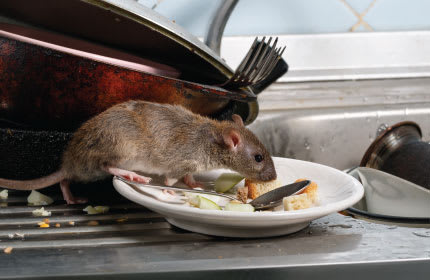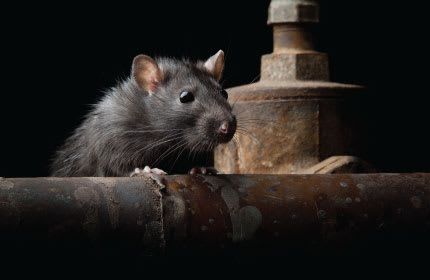


RODENTS
Rodents like mice and rats may seem cute, but they can be a menace. Not only do they cause damage to your property, but they also have a bad reputation for spreading disease and causing problems. Due to how rapidly a rodent’s teeth grow, they are constantly chewing on hard surfaces to sharpen them. This habit can cause costly damage to walls, skirting boards and even electrical wires throughout your home.
Aside from the diseases that rodents themselves can carry, their droppings are also toxic. Droppings are likely to be eaten by pets and have the potential to transmit harmful diseases. If disease from rodents is contracted, you may experience a range of side effects including fevers, vomiting, swelling, rashes, and flu-like symptoms.
Rodents are commonly attracted to the household due to food and shelter and are renowned for contaminating homes with urine and faeces. Rodents thrive in untidy and cluttered environments where they can hide and build a nest for their family. Rodents tend to be found in roofs, garages, unused fireplaces, and storage and office areas - especially if there is a lot of paper, rubbish or food.
It is important to identify the type of rodent you have lingering in your home to determine the best course of action for controlling the problem.
TYPES OF RODENTS
House Mice
House mice are the most common species of mice in Australia. They are typically light grey in colour with long tails and large ears. They can grow up to 95mm long. House mice are most active at night, coming out to look for food. These mice reproduce from just 2 months of age, and as regular as every 4-5 weeks. So, if you spot a mouse, it’s likely you could have an infestation on your hands in just a number of weeks.
Brown Rat
Also known as the Sewer Rat, Brown Rats have a distinctive appearance as their brown to black bodies are bulkier than most rats, with a short tail and small eyes. These rats are mostly found burrowing in gardens and creating nests among trash, cloth and wood piles.
Black Climbing Rat
As their name suggests, these rats are excellent climbers and tend to make a home in secure and elevated environments like house roofs, cabinets or inside walls. Also known as ‘Roof Rats’, these rats will enter your home from trees that are close to roofs or eaves. Steps to prevent rodents from entering your home can include keeping all food and food scrap out of sight, cleaning pet food areas regularly, and keeping gardens tidy and overhanging trees trimmed.




